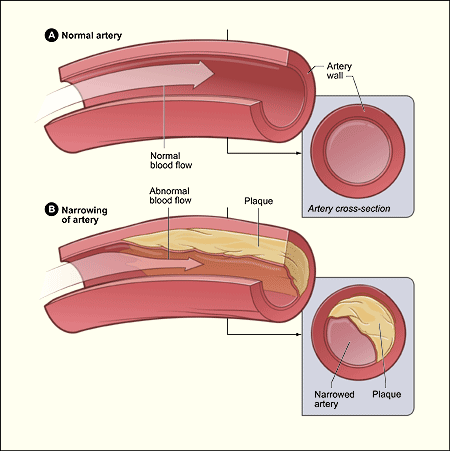What Is Atherosclerosis?
Atherosclerosis (ath-er-o-skler-O-sis) is a disease in which plaque (plak) builds up inside your arteries. Arteries are blood vessels that carry oxygen-rich blood to your heart and other parts of your body.
Plaque is made up of fat, cholesterol, calcium, and other substances found in the blood. Over time, plaque hardens and narrows your arteries. This limits the flow of oxygen-rich blood to your organs and other parts of your body.
Atherosclerosis can lead to serious problems, including heart attack, stroke, or even death.
Atherosclerosis

Figure A shows a normal artery with normal blood flow. Figure B shows an artery with plaque buildup.
Atherosclerosis-Related Diseases
Atherosclerosis can affect any artery in the body, including arteries in the heart, brain, arms, legs, pelvis, and kidneys. As a result, different diseases may develop based on which arteries are affected.
Coronary Heart Disease
Coronary heart disease (CHD), also called coronary artery disease, is the #1 killer of both men and women in the United States. CHD occurs if plaque builds up in the coronary arteries. These arteries supply oxygen-rich blood to your heart.
Plaque narrows the coronary arteries and reduces blood flow to your heart muscle. Plaque buildup also makes it more likely that blood clots will form in your arteries. Blood clots can partially or completely block blood flow.
If blood flow to your heart muscle is reduced or blocked, you may have angina (chest pain or discomfort) or a heart attack.
Plaque also can form in the heart's smallest arteries. This disease is called coronary microvascular disease (MVD). In coronary MVD, plaque doesn't cause blockages in the arteries as it does in CHD.
Carotid Artery Disease
Carotid (ka-ROT-id) artery disease occurs if plaque builds up in the arteries on each side of your neck (the carotid arteries). These arteries supply oxygen-rich blood to your brain. If blood flow to your brain is reduced or blocked, you may have a stroke.
Peripheral Arterial Disease
Peripheral arterial disease (P.A.D.) occurs if plaque builds up in the major arteries that supply oxygen-rich blood to your legs, arms, and pelvis.
If blood flow to these parts of your body is reduced or blocked, you may have numbness, pain, and, sometimes, dangerous infections.
Chronic Kidney Disease
Chronic kidney disease can occur if plaque builds up in the renal arteries. These arteries supply oxygen-rich blood to your kidneys.
Over time, chronic kidney disease causes a slow loss of kidney function. The main function of the kidneys is to remove waste and extra water from the body.
Overview
The cause of atherosclerosis isn't known. However, certain traits, conditions, or habits may raise your risk for the disease. These conditions are known as risk factors.
You can control some risk factors, such as lack of physical activity, smoking, and an unhealthy diet. Others you can't control, such as age and a family history of heart disease.
Some people who have atherosclerosis have no signs or symptoms. They may not be diagnosed until after a heart attack or stroke.
The main treatment for atherosclerosis is lifestyle changes. You also may need medicines and medical procedures. These treatments, along with ongoing medical care, can help you live a healthier life.
Outlook
Improved treatments have reduced the number of deaths from atherosclerosis-related diseases. These treatments also have improved the quality of life for people who have these diseases. However, atherosclerosis remains a common health problem.
You may be able to prevent or delay atherosclerosis and the diseases it can cause. Making lifestyle changes and getting ongoing care can help you avoid the problems of atherosclerosis and live a long, healthy life.
Clinical trials are research studies that explore whether a medical strategy, treatment, or device is safe and effective for humans. To find clinical trials that are currently underway for Atherosclerosis, visit www.clinicaltrials.gov.
September 4, 2012
Silent heart attacks are common and predict risk of death, MRI diagnosis shows
Magnetic resonance imaging (MRI) is more effective than electrocardiography (ECG) at identifying "silent" heart attacks, also known as unrecognized myocardial infarctions, according to a study performed by National Institutes of Health researchers and international colleagues.
The NHLBI updates Health Topics articles on a biennial cycle based on a thorough review of research findings and new literature. The articles also are updated as needed if important new research is published. The date on each Health Topics article reflects when the content was originally posted or last revised.















